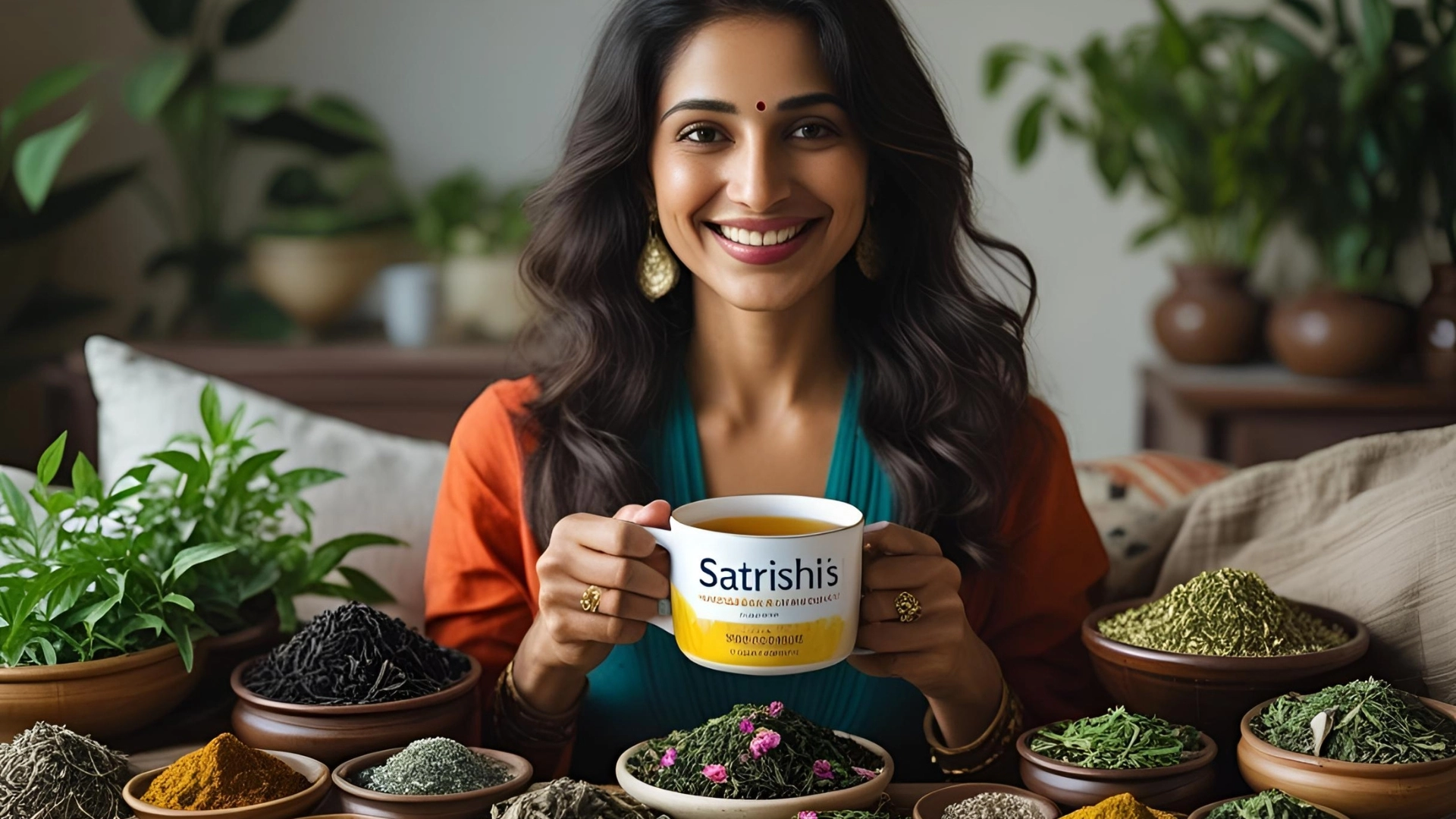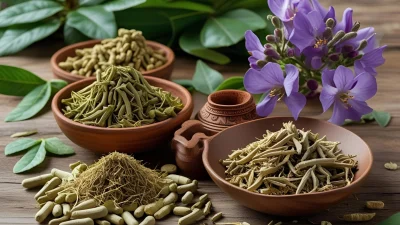100% Herbal & Natural |
Extra 10% OFF with code SATRISHI10 |
Backed by Ayurveda |
Free Shipping Above ₹399 |
100% Herbal & Natural |
Extra 10% OFF with code SATRISHI10 |
Backed by Ayurveda |
Free Shipping Above ₹399 |
100% Herbal & Natural |
Extra 10% OFF with code SATRISHI10 |
Backed by Ayurveda |
Free Shipping Above ₹399 |
100% Herbal & Natural |
Extra 10% OFF with code SATRISHI10 |
Backed by Ayurveda |
Free Shipping Above ₹399 |

Hormonal imbalances can feel like an invisible weight, disrupting your energy, mood, and overall well-being. From irregular periods to menopausal discomfort, these challenges affect women of all ages—students juggling exams, professionals managing stress, or seniors navigating life’s transitions. Ayurveda, India’s ancient holistic healing system, offers time-tested remedies to restore balance naturally. By harnessing the power of herbs like Shatavari, Ashoka, and others, you can support your body’s harmony without relying on synthetic solutions. In this guide, we’ll explore the best ayurvedic herbs for hormonal balance, their benefits, and how they can empower women to thrive. Discover how Satrishi’s 100% herbal, plant-based wellness supplements at satrishi.com can be your partner in this journey.
Hormones are the body’s messengers, regulating everything from your menstrual cycle to mood and metabolism. Imbalances can lead to symptoms like fatigue, mood swings, irregular periods, or even conditions like PCOS (polycystic ovarian syndrome). Stress, poor diet, and environmental factors often exacerbate these issues. Ayurveda views hormonal health as a balance of the body’s doshas—Vata, Pitta, and Kapha. When these energies are misaligned, symptoms arise. Ayurvedic herbs work holistically to nurture the body, calm the mind, and restore equilibrium, making them ideal for women seeking natural solutions.
Ayurveda offers a treasure trove of herbs that support women’s hormonal health. Below, we dive into the most effective ones, their benefits, and how they can fit into your wellness routine.

Shatavari, or Asparagus racemosus, is often called the “Queen of Herbs” in Ayurveda for its nurturing effects on the female reproductive system. Its name, meaning “she who has a hundred husbands,” reflects its ability to enhance vitality and fertility. Shatavari is an adaptogenic herb, meaning it helps the body cope with stress, a common trigger for hormonal imbalances.
Shatavari is rich in phytoestrogens, plant-based compounds that mimic estrogen, helping to regulate hormonal fluctuations. Research suggests Shatavari may reduce menopausal symptoms like hot flashes and support lactation in nursing mothers. It’s particularly beneficial for women with irregular periods, PMS, or menopausal discomfort. Students dealing with exam stress or young mothers balancing new responsibilities can benefit from its calming and rejuvenating properties.
How to Use: Mix ½ teaspoon of Shatavari powder with warm milk or water twice daily. It blends beautifully into smoothies or herbal teas. Explore Satrishi’s Shatavari Powder for a pure, organic option to support your cycle.
Caution: Avoid Shatavari if you’re allergic to asparagus or have kidney issues, as it has diuretic properties. Consult a doctor if you’re pregnant or on medication.
Ashoka, derived from the bark of the Saraca indica tree, is known as a woman’s “natural friend” in Ayurveda. Its anti-inflammatory and analgesic properties make it a go-to for managing heavy menstrual bleeding, uterine cramps, and hormonal imbalances. Ashoka strengthens the uterus, promotes regular periods, and supports reproductive health, making it ideal for women with PCOS or menopausal osteoporosis.
This herb is particularly helpful for women experiencing irregular cycles or pelvic discomfort. Its cooling nature soothes Pitta-related symptoms like irritability and inflammation. Professionals facing work stress or women in their 40s navigating perimenopause can find relief with Ashoka’s gentle support.
How to Use: Ashoka is often consumed as a tonic like Ashokarishta, mixed with water after meals. Try Satrishi’s Ashoka Powder for a versatile way to incorporate this herb into your routine.
Caution: Overuse may cause indigestion or nausea. Consult an Ayurvedic practitioner for personalized dosage.
Ashwagandha, or Withania somnifera, is a powerful adaptogen that tackles stress, a major culprit behind hormonal imbalances. By lowering cortisol levels, Ashwagandha helps regulate the hypothalamic-pituitary-adrenal axis, which influences reproductive hormones. Studies show it may reduce stress by up to 30%, improving mood and energy.
This herb is a game-changer for students, working mothers, or seniors dealing with fatigue and anxiety. It also supports thyroid function, which is crucial for hormonal balance. Ashwagandha’s grounding effect makes it ideal for balancing Vata dosha, calming the nervous system, and promoting restful sleep.
How to Use: Take 1-2 capsules or ½ teaspoon of Ashwagandha powder with warm milk before bed. Satrishi’s Ashwagandha Capsules offer a convenient way to harness its benefits.
Caution: Avoid if you have hyperthyroidism or are sensitive to nightshades. Consult a doctor if taking sedatives or antidepressants.
Lodhra, from the Symplocos racemosa tree, is a lesser-known but potent herb for hormonal health. It balances Pitta and Kapha doshas, helping to regulate menstrual cycles and reduce symptoms like acne and excessive bleeding. Lodhra’s astringent properties support uterine health, making it valuable for women with PCOS or irregular periods.
This herb is ideal for young women managing hormonal acne or those seeking to stabilize their cycles. Its detoxifying effects also promote clear skin and overall vitality.
How to Use: Mix ¼ teaspoon of Lodhra powder with honey or water. Check out Satrishi’s Lodhra Powder for a pure formulation.
Caution: May cause digestive discomfort in high doses. Consult a practitioner for guidance.
Several other Ayurvedic herbs complement Shatavari, Ashoka, and Ashwagandha for holistic hormonal support:
Gokshura: Known for boosting stamina and supporting reproductive health, Gokshura is great for women with low libido or fatigue.
Saffron: This precious spice reduces menstrual cramps and uplifts mood, perfect for women with PMS or menopausal mood swings.
Fenugreek: Supports digestion and hormonal balance, especially for nursing mothers.
Amla: Rich in antioxidants, Amla enhances immunity and supports overall vitality, complementing other herbs.
These herbs work synergistically to nourish the body and mind. Explore Satrishi’s Women’s Health Tea, which blends Shatavari, Ashoka, and other herbs for a delicious daily ritual.
Ayurvedic herbs offer versatile benefits for women across life stages. Here’s how they can support specific audiences:
Students (18–25): Academic stress can disrupt cycles and cause mood swings. Shatavari and Ashwagandha reduce anxiety and promote focus, helping students stay balanced. Try a morning Shatavari smoothie or evening Ashwagandha tea to unwind. Learn more in our blog on Ayurveda for Stress Management.
Working Professionals (25–40): Juggling careers and personal life can spike cortisol, leading to irregular periods or fatigue. Ashoka and Lodhra regulate cycles, while Ashwagandha boosts energy. Incorporate these into your routine with Satrishi’s herbal powders or capsules.
Mothers (Postpartum): New moms often face hormonal shifts and fatigue. Shatavari supports lactation and recovery, while Fenugreek enhances milk production.
Seniors (45+): Menopause brings hot flashes, mood swings, and sleep issues. Shatavari and Ashoka ease these symptoms, promoting comfort and vitality. A daily dose of Satrishi’s Menopause Support Blend can make a difference.
Science is beginning to validate Ayurveda’s wisdom. A 2024 study found Shatavari root extract reduced menopausal symptoms like hot flashes and improved quality of life in women aged 40–65. Ashwagandha has been shown to lower cortisol levels, supporting hormonal balance indirectly. Ashoka’s anti-inflammatory properties help manage pelvic inflammation, a common issue in PCOS. While more human studies are needed, these findings align with centuries of Ayurvedic practice.
Integrating Ayurvedic herbs is simple and flexible. Powders can be mixed into warm milk, water, or smoothies, while capsules offer convenience for busy lifestyles. For best results, take herbs consistently and pair them with a balanced diet and yoga. For example, a morning ritual of Shatavari powder in almond milk can set a calm tone for the day, while Ashwagandha at night promotes restful sleep. Visit Satrishi’s Ayurvedic Recipes Blog for creative ways to use these herbs.
1. What are the best ayurvedic herbs for hormonal balance?
Shatavari, Ashoka, Ashwagandha, and Lodhra are top choices. They support menstrual regularity, reduce PMS symptoms, and ease menopausal discomfort by balancing doshas and hormones.
2. How do ayurvedic herbs for hormonal balance work?
These herbs contain bioactive compounds like phytoestrogens and adaptogens that regulate hormonal pathways, reduce stress, and support reproductive health. For example, Shatavari mimics estrogen, while Ashwagandha lowers cortisol.
3. Are ayurvedic herbs for hormonal balance safe?
When taken as directed, these herbs are generally safe. However, consult a doctor if you’re pregnant, breastfeeding, or on medication, as herbs like Shatavari may interact with diuretics or blood sugar medications.
4. How long do ayurvedic herbs for hormonal balance take to work?
Results vary, but many women notice improvements in 2–4 weeks with consistent use. For chronic conditions like PCOS, it may take 2–3 months.
5. Can men use ayurvedic herbs for hormonal balance?
Yes, herbs like Ashwagandha and Gokshura support testosterone levels and overall vitality in men, making them versatile for both genders.
While Ayurvedic herbs are natural, they’re not without precautions. Shatavari may cause digestive upset in high doses or if you’re allergic to asparagus. Ashoka can lead to nausea if overused. Ashwagandha may interact with thyroid or sedative medications. Always start with a small dose and consult an Ayurvedic practitioner or doctor, especially if you have underlying health conditions or are pregnant. Store herbs in a cool, dry place to maintain potency, as organic products can attract bugs if not sealed properly.
Ayurvedic herbs like Shatavari, Ashoka, Ashwagandha, and Lodhra offer a natural, holistic way to support women’s hormonal health. Whether you’re a student battling stress, a professional managing a busy life, or a senior navigating menopause, these herbs empower you to feel your best. Backed by centuries of tradition and emerging science, they address the root causes of imbalances, promoting vitality and well-being. At Satrishi, we’re committed to bringing you 100% herbal, plant-based supplements to support your journey. Try our Shatavari Capsules or Women’s Health Tea today and embrace the power of Ayurveda for hormonal harmony.
Image Credit: Canva
No account yet?
Create an Account